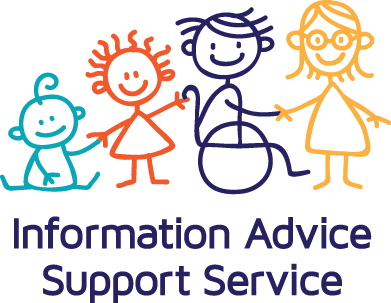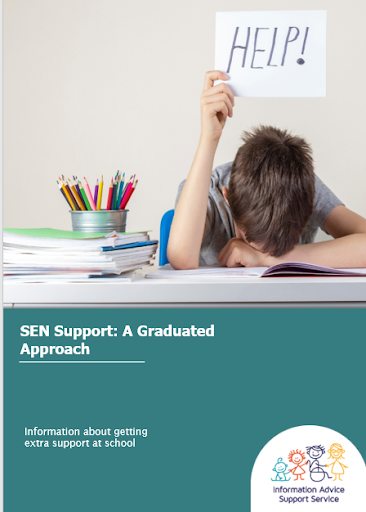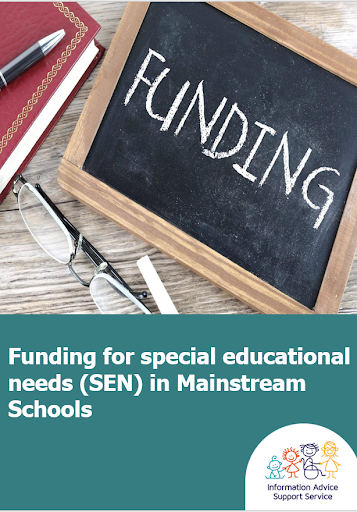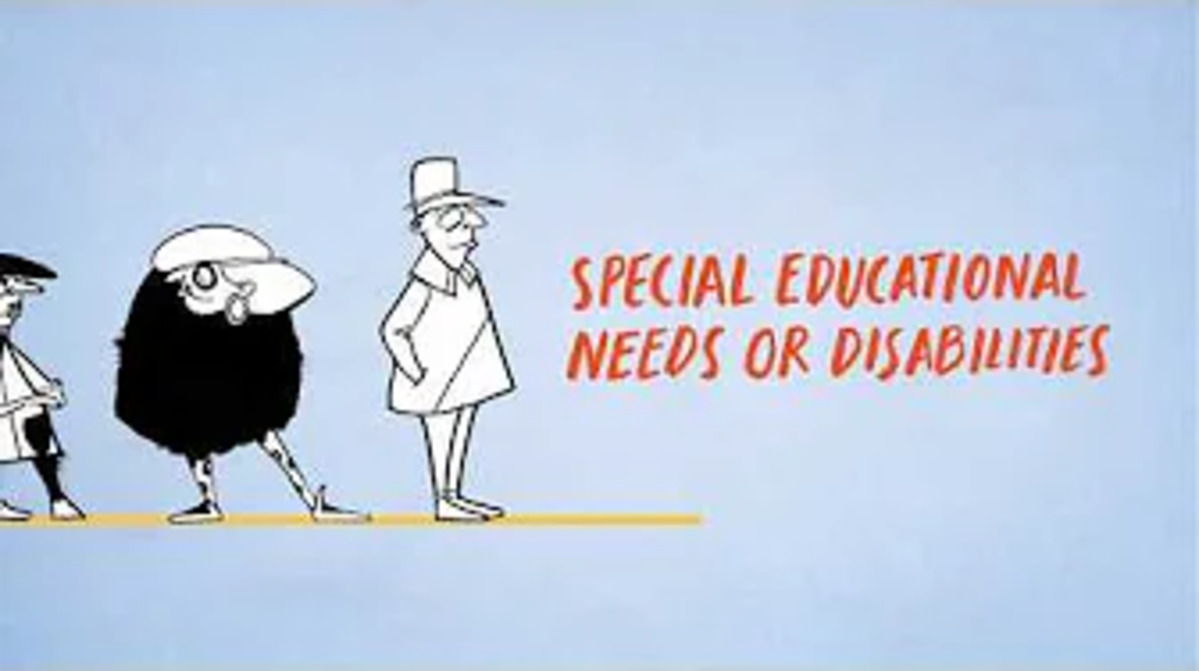Education
SEN Support
Special Educational Needs Support (SEN Support)
SEN Support means support which is additional to or different from the support generally available to children and young people of the same age in nursery, school or college. All children and young people with special educational needs should receive SEN Support to help them achieve their outcomes or learning objectives and by removing barriers to learning. A child does not need a medical diagnosis to be recognised as having SEN.

Nurseries, schools and colleges must record the SEN that they have identified, what outcomes the child or young person are expected to achieve and what provision is in place to enable the child to reach those outcomes. If SEN Support does not improve a child or young person’s progress or meet their needs, the nursery, school or college should request a statutory assessment (the first step towards getting an EHC plan) from the local authority.
For many children and young people, receiving SEN Support is an important step before EHC needs assessments as it helps professionals to see what has and hasn’t worked so far, and what further support may be needed that would only be available with an EHCP.
For more information about SEN Support see our booklet
Funding in Mainstream schools
Mainstream schools receive funding in 3 parts for pupils with SEND. They are known as Element 1, 2 and 3.
You can ask your school how it uses its SEN budget to support your child and whether it has enough to make all the provision they need. The local authority also publishes a Local Offer that explains what type of resources this money might be spent on.
To find out more about what the Local Authority normally expects mainstream schools or settings to provide form their own budget click on the local offer page here.
EHC Assessment
Education Health Care (EHC) Assessment or Statutory Assessment
An Education, Health and Care (EHC) needs assessment is the first step in the EHC process. A young person or child’s parents or an education setting can request an EHC needs assessment, or any professional who believes it may be needed, eg a medical professional or social worker.
Having received a request, the local authority (LA) must consider whether the child has or may have SEN which may need special educational provision (SEP) to be made through an EHC Plan.

If the answer to these is yes, it must perform an assessment, gathering advice from the child’s parents or young person, and professionals that have been involved with their education and support so far, such as teachers and therapists. The assessment may result in a decision not to provide an EHC plan, in which case they must notify the child’s parents/young person of the decision and their right to appeal. If the LA decides an EHC plan is needed, they will send the parents/young person a draft plan. Parents and young people can send their comments on the draft to the local authority. The entire process from the date the LA receives the request to when a final plan is agreed, should take no more than 20 weeks.
For more information about SEN Support see our booklet
Funding in Mainstream schools
Mainstream schools receive funding in 3 parts for pupils with SEND. They are known as Element 1, 2 and 3.
You can ask your school how it uses its SEN budget to support your child and whether it has enough to make all the provision they need. The local authority also publishes a Local Offer that explains what type of resources this money might be spent on.
To find out more about what the Local Authority normally expects mainstream schools or settings to provide form their own budget click on the local offer page here.
EHC Plans
Education Health Care Plan
An EHC plan is a legal document that describes a child or young person’s special educational, health and social care needs. It is for children and young people aged up to 25 years and an EHC needs assessment needs to be carried out to see whether an EHC plan is needed to help provide and coordinate support for a child or a young person.
The Plan details the support required to meet a child/young person’s needs, the outcomes they are working towards and will name the educational setting they will be attending. Once named the educational setting is responsible for ensuring that the support detailed in the plan is in place to meet the child/young person’s needs and work towards their outcomes. The EHC plan must be reviewed regularly.
For children under 5 years old this will happen every 6 months and for children aged 5 or over the review will be held annually by the educational setting the child/young person attends.
For more information, please see our booklet ‘What is an EHC plan?’ here.
Videos about Education, Health, Care, Plans (EHCP):
Draft EHC Plan
Where the LA is going to issue an EHC plan, the first step is for the LA to send the parent or young person a draft EHC plan. This will allow the parent or young person to consider the contents of the EHC plan.
This will include the child/young person’s SEN, health and care needs, the provision to meet each of those needs and the outcomes that should be achieved. It will also record the parent and young person’s aspirations, views and feelings.
Our information booklet on ‘receiving a draft or proposed EHC plan’ describes in detail how to go through a draft EHC Plan.
How to write a good EHC Plan
The Council for Disabled Children (CDC) have developed a resource to help practitioners write good quality EHC plans that meet the requirements of the Children and Families Act 2014. For further details, please have a look at the following link. The first part includes excerpts from real EHC plans, the second part has two EHC plans which draw on real examples (although the plans themselves relate to fictional children):
Final EHC Plan
The final EHC Plan that you receive will either:
- be the same as the draft plan, with the name of the school your child will attend in Section I, or:
- be updated to include some or all of the changes you have requested to Sections B and F of the EHC Plan, and also the name of the school your child will attend in Section I.
The school named in Section ‘I’ may be the one you have asked for, or another school chosen by the local authority.
If the name of the education setting is not written in the final plan, The LA may name the type of setting your child will attend i.e., special day school or mainstream day school.
The final EHC Plan must be signed and dated by the Local Authority. It will come with copies of all the reports from professionals (known as appendices) and a letter from the Local Authority telling you about your right to appeal to the First Tier Special Educational Needs Tribunal if you disagree with the contents of Sections B, F or I of the final Plan. The deadline for appealing is 2 months of the date of the letter.
If you have requested any changes to the draft EHC Plan, check that these changes that have been agreed between you and the LA and the changes are in the Final Plan. Changes you request to Sections B & F should be supported by professional evidence from the EHC needs assessments.
For more information, please read our booklet on ‘Receiving a Final Plan’
Maintaining an EHCP
Once a child or young person has an ECHP, the Local Authority is responsible for making sure the child or young person gets the help that is written in the plan. This is known as maintaining the plan. If the school does not follow the plan you need to contact your Local Authority to make a complaint. If a child’s needs have changed and the current plan is not working, an early Annual Review can be requested to make the any changes needed.
Requesting change of school/placement
If you would like to change your child’s school, you can make a request to do this at any time of the year. If the Local Authority do not agree, you do not get any appeal rights to challenge their decision. However, you do get a right of appeal if the request is made at an Annual Review or early review of the EHC plan.
Moving in or out of Westminster with an EHCP
If you have an Education Health Care Plan and move in or out of the borough. You need to tell the Local Authority as soon as you know or at least 15 working days before your moving day. The Local Authority will transfer your EHC plan to the new Local Authority on the day of the move.
If an EHC needs assessment has been completed and a plan has not been given yet, you can pass on the assessment reports to the new Local Authority, who will decide whether to give you a plan or not.
Annual Reviews
Annual Reviews
Annual Reviews
This is the formal review of an EHC plan which the Local Authority is responsible for completing on an annual basis. If a child or young person has an EHCP it needs to be reviewed every 12 months to check the child or young person is making progress and the provision in Section F continues to meet their needs. A discussion takes place to decide whether changes are required to the outcomes, the support the child/young person receives, whether a change of educational setting is needed or whether the EHCP should discontinue/stop (Cease to maintain the EHC Plan).
An Annual Review is a process that includes a meeting and Local Authority sending a decision letter to confirm any amendments to the Plan (changes) 4 weeks after the review meeting.
Early Annual Reviews:
Our booklet on ‘Annual Review’ details what should happen during an Annual Review process.
Videos on Annual Review
Click the video for IAS Guidance on preparing for Annual Reviews,
Click the video to view Council for Disabled Children video on Annual Review
Choosing a suitable education setting
Identifying a suitable school or setting
Most children with SEND can have their needs successfully met in mainstream schools. All mainstream schools are provided with resources to support those with additional needs.
Across the Westminster and the Royal Borough of Kensington & Chelsea (known as the Bi-Borough), there are various types of schools and settings. These each provide support to children and young people with special educational needs and/or disabilities (SEND) in different ways. The type of school or setting which is best suited to a particular child or young person will most often depend on the complexity of their needs.
Types of schools
Mainstream schools:
Mainstream schools and early years settings provide education for most children with special educational needs and/or disabilities (SEND), including those who have difficulty learning to read and write, learning how to manage their behaviour and/or how to listen and communicate.
Schools, early years settings and the local authority work together so that resources are matched to a child and young person’s needs.
Resource bases:
Specialist resource bases are based within mainstream schools. They provide targeted support to help children make progress, achieve their identified outcomes and continue to access the mainstream curriculum while being provided with a specialist intervention programme. This may include additional and different provision, such as speech and language therapy, occupational therapy or music therapy.
Local Authority maintained Special schools:
Special schools provide education for children with multiple and/or more complex special educational needs and disabilities.
Special schools provide adapted and different education to support young people to ensure that they achieve the specific outcomes they have identified, with the aim of working towards independence.
Independent and non-maintained Special schools:
Section 41 of the Children and Families Act 2014 allows the Secretary of State to publish a list of approved independent educational institutions, independent special schools and post-16 institutions (that can be named on the Education Health Care Plan). Independent institutions that have been included on the Section 41 list have agreed that local authorities can name them on EHC Plans. These schools can only be included on the list with their consent.
The list is updated to include approved applicants and remove institutions who have not continued to meet the Section 41 eligibility criteria.
To find out more information about this and lists of schools, please click on the below link that will take you to the Westminster Local offer here
Identifying a suitable school
When choosing a school, you should read the schools SEN Information Report which is sometimes called the SEN Report or SEN Offer. You should find this on the school’s website as it is a statutory requirement for schools to publish one. Other helpful information to read are the schools’ policies on SEND & Inclusion, Behaviour and Bullying.
Information that should be included in an SEN Information Report:
- The external professionals/services/ teams that come into the setting to provide services for pupils with SEN and disabilities. If your child receives SEN Support this will help you to understand what kinds of extra support the school can put in place for your child to meet their needs.
- Training provided to school staff to help them support pupils with SEND
- Processes in place for assessing and identifying pupils with SEN and how these are communicated to parents
Children / YP on SEN Support (without EHC plans)
If your child or young person does not have an EHCP, you will need to apply for a primary school, secondary school or post 16 institution through the usual admissions processes – even if you are waiting to hear from the local authority about a request for EHC needs assessment, or the assessments are happening and you are waiting to hear if the LA will agree to issue a Plan. This is to ensure that your child has a confirmed school place whatever the LA decides.
Information about applying for primary or secondary schools can be found on the Westminster Admissions page on the local authority website here.
For post 16 admissions, please see information here.
Children and Young People with an Education Health Care Plan
Please see the IASS information brochure ‘Identifying a Suitable Setting’
Early Years Education
Early Years
The SEND Code of Practice 2015 places duties on Early years providers to provide information for parents on how they support children with SEN and disabilities.
When securing funded early education for two-, three- and four-year-olds local authorities should promote equality and inclusion for children with disabilities or SEN. This includes removing barriers that prevent children accessing early education and working with parents to give each child support to fulfil their potential
All early years providers have duties under the Equality Act 2010. They must not discriminate against, harass or victimise disabled children, and they must make reasonable adjustments, including the provision of auxiliary aids and services for disabled children, to prevent them being put at substantial disadvantage.
If a nursery is unable to meet your child’s needs within their existing SEN budget, you should ask your nursery whether they can apply for the enhanced ‘SEN Inclusion Fund’ (SENIF). This fund is available to ensure the inclusion of children with additional needs in early education. The Enhanced SENIF is for:
2-year-olds (living in the bi-borough) may be eligible for 15 hours early education for 38 weeks of the year (term time) if you are in receipt of:
- Income support
- Income based Jobseeker’s Allowance
- Income related Employment and Support Allowance (ESA)
- Universal Credit – if your household income from work is £15,400 or less a year, after tax.
- Tax credits and an income of £16,190 or less a year, before tax
Or, if any of the following apply:
- Child looked after by the local council
- They have a current Education Health Care (EHC) Plan
- They get Disability Living Allowance (DLA)
- Have left care under a special guardianship order, child arrangements order or adoption order
3- and 4-year-olds
3- and 4-year-olds are entitled to a free universal early education place. Each place provides 15 hours of early years education for up to 38 weeks per year.
In addition, working parents may be eligible for 30 hours of free childcare if your circumstances are as follows:
- Both parents are earning or expect to earn the equivalent to 16 hours at National Minimum or Living Wage over the coming 3 months.
Here are some examples of what SENIF can be used for:
- Provide a higher ratio of staff so that children can receive dedicated time with one adult
- Staff can access specific training related to the child
- Buying in therapies such as Speech therapy or the Educational Psychology service
- Making adaptions to the environment or equipment
- Making or buying specialist resources.
Additional funding:
The Government introduced new funding for Early Years childcare providers to enable them to offer more places to young children with special educational needs or disabilities (SEND). This funding is called the Disability Access Fund (DAF). The DAF is available to Early Years childcare settings and can be used, for example, to support them with making reasonable adjustments to their provision.
Three and four-year old children may be eligible for the DAF if they meet the following criteria:
- The child is in receipt of Disability Living Allowance (DLA) and
- The child receives universal or extended free early education and childcare entitlement.
To find out more, including information about providers that offer funded places, contact the Westminster Family Information Service (FIS):
Bi-BoroughChildCareEarlyEd@rbkc.gov.uk
: 07971 625922
This link will take you to more information about this on the Westminster Local Offer site.
Home Education
Home Education
Educating at Home
Section 7 of the Education Act 1996 states that:
The parent of every child of compulsory school age shall cause him to receive efficient full-time education suitable –
(1) to their age, ability and aptitude, and
(2) to any special educational needs, they may have,
either by regular attendance at school or otherwise.
Elective Home Education (EHE)
You may consider electively home educating your child if you feel that their school setting is not meeting their needs, if you cannot secure your preferred provision for them, or if they are being bullied.
You don’t have to request permission to home educate, but if your child is in school you need to write to the head of the school and ask them to take your child’s name off the school register. It doesn’t make any difference if your child has an Education Health Care Plan (EHCP) unless it is a special school. If your child is at a special school, you need permission from the local authority to remove your child from school.
Local authorities have a duty to make arrangements to identify children outside school who aren’t receiving an education but there is no statutory duty to monitor home education on a routine basis. Suitable education is defined in law as education which is suitable to the child’s age, ability, aptitude and special needs.
If your child has an EHCP, you do not have to make the provision set out in the EHCP, but you do have to take account of your child’s special educational needs.
Choosing to electively home educate when your child / YP has an EHCP means that the LA no longer has a legal duty to secure any of the special educational provision which was specified in the EHCP. This is because you are deemed to be making your own suitable alternative arrangements
However, the local authority must still review the plan annually to assure itself that the provision set out in it continues to be appropriate and that the child’s SEN continues to be met (paragraph 10.32).
Education Otherwise than at School (EOTAS)
If the LA arranges for special educational provision to be delivered somewhere other than in an early year setting, school or college this is known as “education otherwise than at school”. If EOTAS is arranged for a child or YP with an EHCP, the LA is responsible for continuing to secure the provision and to fund it.
This can happen when nursery, school or college is not appropriate for the child or YP. For a child or YP with an EHCP, education otherwise means that the LA must ensure the special educational provision is delivered. This is different to elective home education, where a parent decides to educate a child or YP themselves at home because an educational placement is not working. Education Otherwise is sometimes preferable than elective home education when a child or YP has a Plan, because the LA must continue to provide the funding and the provision. With elective home education, they have no duty to provide any support.
In the case of EOTAS, a child or YPs home cannot be named in Section I, so if the child or YP will not be attending an educational setting at all, then Section I should be left blank and the provision should be specified in Section F of the Plan.
SEN Transport
Home to School Travel Arrangements
All local authorities have a statutory duty to provide travel arrangements for children aged between 5-16 years that have been assessed through an application process as eligible for the service.
“Travel arrangements” are defined in section 508B(4) Education Act 1996 and paragraphs 31-35 of the government’s statutory guidance Home to School Travel and Transport Guidance 2014.
Home-to-school travel arrangements in relation to an eligible child are travel arrangements in both directions between the child’s home and the relevant educational setting.
The law sets out minimum walking distances for pupils to be eligible for travel assistance from their local authority. These are:
- beyond 2 miles (if below the age of 8) or
- beyond 3 miles (if aged between 8 and 16).
All children below the age of 16 are entitled to free travel on London Transport Buses by applying for an Oyster Card.
The law refers to travel rather than transport, therefore travel assistance can consist of a range of options depending on the needs of the child.
This can include arrangements for the provision of transport, and any other arrangements if the parent gives consent:
- provision of one or more escorts (whether alone or together with other children) when travelling to or from the relevant educational establishment
- payment of the whole or any part of a person’s reasonable travelling expenses
- payment of allowances in respect of the use of specific types of travel
- voluntary arrangements made by the parent.
Children under the age of 5
Children below compulsory school age are not automatically entitled to travel assistance to an early year setting. Compulsory school age begins on the first day of the term following their fifth birthday. The Education Act 1996 (section 509A) gives local authorities the discretion to make travel arrangements for children in early years settings, but they cannot refuse to make a travel arrangement just because the law says they do not have to.
If a child is at school but under compulsory school age local authorities have the discretionary power to make travel arrangements if it will facilitate the child’s attendance at school.
Travel assistance for children with SEND aged 5 to 16
For children who have special educational needs (SEN), the usual distances do not apply although the distance will be considered alongside the complexity of their individual needs. A child or young person does not need an Education Health Care Plan to be eligible for SEN travel assistance.
The local authority will assess each case to see if the child:
“Cannot be reasonably expected to walk to school because of their mobility problems or because of associated health and safety reasons related to their SEN”
The local authority will also consider:
- the needs of the child
- the complexity of the home to school journey
- the use of public transport whenever possible and appropriate
- promoting independent travel and travel training promoting a healthy approach to travel assistance as far as possible by:
- encouraging children to walk to school
- the most cost-effective travel assistance arrangements.
LAs sometimes ask parents to pay for transport when there is a dispute over the placement which should be named in Section I of the EHC plan. This can often happen if placement at the parent’s preferred setting may cost more than the nearest available school. Parents should only agree to this if the school the LA wishes to name in the Plan is in fact suitable, and the LA can show that the parent’s preferred school would be an inefficient use of resources.
Travel assistance post 16
There is statutory guidance for the groups of young people that local authorities should prioritise for home to school/college transport assistance and this includes those with SEN.
Statutory guidance on Post 16 transport
There is no automatic entitlement to transport for those of sixth form age, but LAs have the discretion to assist with transport arrangements, considering what arrangements for travel or financial support would facilitate young people’s attendance.
Travel assistance post 19
Government guidance on home to school transport assistance states that:
“Local authorities also have a duty under the Education and Skills Act 2008 to encourage, enable and assist the participation of young people with learning difficulties and/or disabilities up to the age of 25 in education and training”
The LA’s duty in respect of adult learners is covered by section 508F of the Education Act (“EA”) 1996. ‘Adult learners’ will be young people over sixth form age – those who are 19 and up (if they started a course of further education before their 19th birthday, they remain of sixth form age until they complete that course).
When considering adult learners, the LA must make “such arrangements for the provision of transport, as they consider necessary”.
Westminster Transport Assistance Policy
The local authority’s Transport Assistance Policy for children aged 5 to 16 is updated and published annually on the local offer website and an application form can be downloaded from the site. Details of post 16 transport assistance are also published on the Westminster local offer here.
If you disagree with a decision made by the Travel Care and Support Service (Home -School Travel) you have the right to appeal. Appeal forms can be downloaded from the local offer.
Useful organisations:
Special Educational Needs Transport Advocacy Service website provides families with Information on home to school transport including the legislation and statutory government guidance that surround this issue.
IPSEA offers free and independent legally based information, advice and support to help get the right education for children and young people with all kinds of special educational needs and disabilities (SEND).
Website has advice and information about concerns a family might have about raising a child with additional needs.
Helpline: 0808 808 3555




